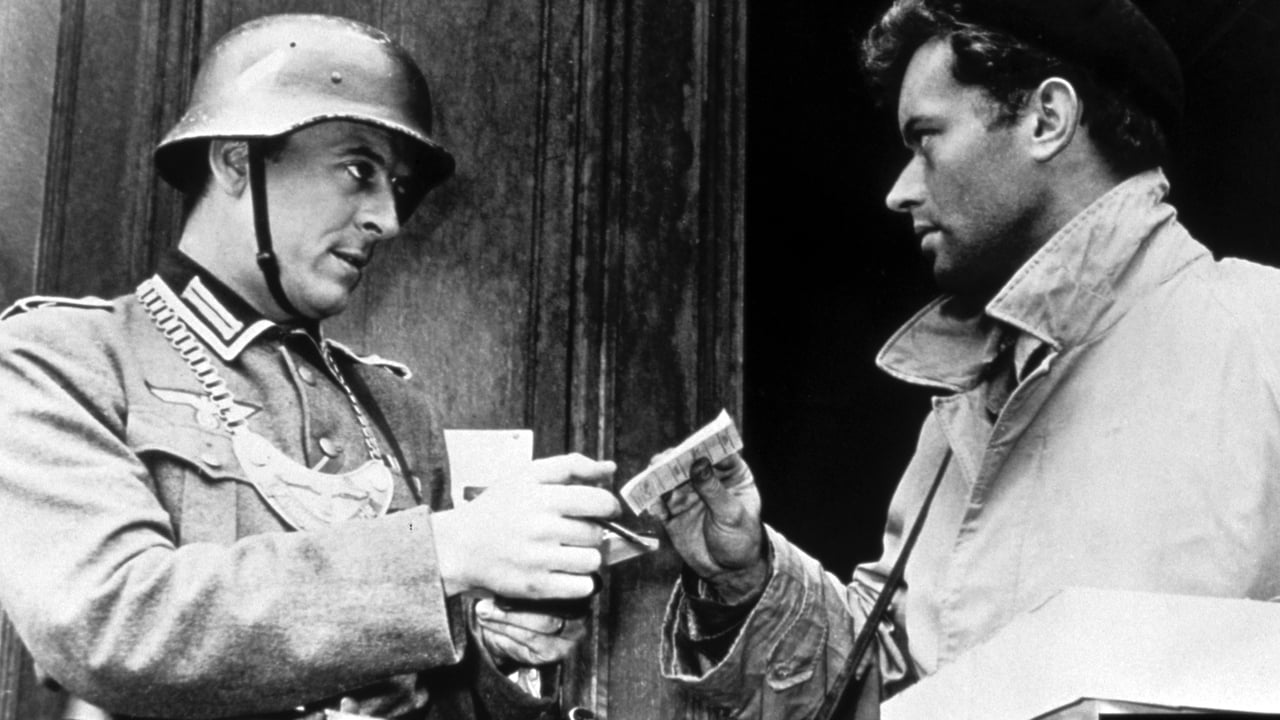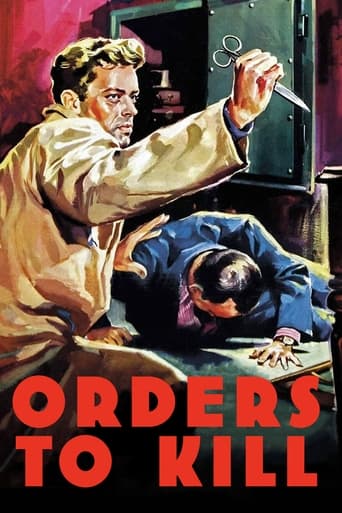

I can recommend this little war thriller which has brains and heart behind it. Within the broad theatre of war it focuses on the moral impact of "orders" on a sensitive personality. Production values are good within the scope of the film and there are plenty of clues about the developing issue. We start to have reservations about the main character, who is clearly immature and not suited to the mission he is sent on. His behaviour is inept, but it is not hard to relate to his dilemma. The denouement winds up the story gracefully without weakening the horror of what has occurred, and in a way that the viewer does not expect, dignity is restored to the hero. I had not previously encountered the lead actor who is a little-known Canadian actor. I dislike the way he looks in this, with a neatly combed 1950s blonde quiff on which a ridiculously small beret is perched. He looks about as "French" as a bacon burger. But in a way that fits in with his feeble performance in the role of assassin. The film never goes into an examination of who was responsible for the false intelligence behind the mission. That is where the blame for the fiasco rests. But no doubt this sort of thing occurred and the people in the field never got to find out who was the author of the blunder.
... View MoreThis movie ,in spite of its tragic plot,shows Asquith's infatuation with France :not only the hero is served a delicious quiche Lorraine in one of the first scenes ,but he also used an old French song from long ago;besides, the stand out of his work is arguably English actor Leslie French(!) ,really admirable in the scenes with his pussycat,the victim who can ask why ,unlike the people who die during the bombings .There is also a strange use of this old French folk song from 1792 ,"Cadet Rousselle":no,it's not a Chanson about Revolution;it actually makes its hero an object of ridicule:the first lines go like this: "Cadet Rousselle A Trois Maisons Qui N'Ont Ni Poutres Ni Chevrons " "Cadet Rousselle has got three houses which have neither beams nor rafters (...)it's to put up the swallows..)This choice may be bewildering for a French viewer who may wonder whether they did not choose stuff like " Auprès De Ma blonde" ;probably because the dear lady who taught our hero the FRench language taught him this song and to both of them ,it's a dear memory.That said ,it's disappointing that French is almost never used in France ,even when the Parisians speak between them.The first third,including training with James Robertson Justice ,is a bit slow-moving ,and Mrs Lilian Gish is wasted ;but the movie hits its stride in the second third and grabs the viewer till the end .The principal,Paul Massie, gets good support from Irene Worth as Leonie ,a woman war has hardened ,and particularly Leslie French,whose very moving performance was hailed by French critic Jean Tulard .The screenplay puts the blame on the absurdity of war ;the victim loves cats ("but so does Himmler" Leonie hastens to add).The famous proverb " you can't make an omelet without breaking eggs" does not give a meaning to what he did .You will not forget the little girl who played Cinderella's wicked sister ,and ,in real life ,had to play the part of an orphan of the war.
... View MoreAs the Allies are preparing the D-Day invasion, an American bomber pilot (Paul Massie) is recruited to be sent to occupied France to kill a member of the Resistance (Leslie French) who is suspected of supplying the names of fighters to the Germans. Each part of the film, the recruiting, training and the mission itself, is expertly done. There is expert drama in both his recruitment and training under James Robertson Justice, whose expertise in these matters is brilliantly portrayed. The film shows the excellent acting of Eddie Albert who plays an American officer who monitors Massie's training and then his deployment on a night flight to be parachuted into occupied France, where he is to be on his own except for his one contact played by Irene Worth, whose part turns out to be the best one in the film. The title pretty much sums up the dilemma that faces Massie as he's the one ordered to carry out the execution.
... View MoreAnthony Asquith,son of the Earl of Oxford,public school and University - educated,was a charming,intelligent and sophisticated man who made films that tended to reflect his personality."Pygmalion","The Winslow Boy","The Browning Version" were all popular with the moviegoers of Middle England who comprised his core audience.But in the late 1950s he suddenly changed tack and produced two extraordinary works debating the nature of courage,moral and physical."Carrington VC" starred David Niven,and "Orders to kill" featured Associated British contract actor Paul Massie. Canadian - born Mr Massie - slim,aesthetic - looking and sensitive - had a somewhat irregular movie career but won a richly - deserved BAFTA for "Most promising newcomer" for his performance as a French - speaking American flyer sent over to Occupied France to assassinate a Resistance member turned traitor. He is willing if not happy to kill from 20,000 feet up,but mano a mano is quite a different matter,particularly as the more research he does on his putative victim the more doubts he has about the man's guilt. He expresses his misgivings to his superiors but they are implacable,he must carry out his mission. "Orders to kill" brings into question the ethics of war just as "Carrington VC" does its effects on the individual. Is it ever "right" to take a human life even if such an act is sanctioned by Church and State?This is an argument familiar from the days of Capital Punishment,and a pillar of the stance of the Conscientious Objector. Will Massie's moral scruples be interpreted as cowardice by London in just the same fashion as would his refusal to fly any more bombing missions on similar grounds? Asquith reveals no easy answers. Not a War Film per se,"Orders to Kill" remains the British Cinema's finest examination of the minutiae of man's conduct in time of conflict. Generally ignored when Puffin Asquith's movies are discussed,it is criminally neglected and the work of a man of conscience who understood such insubstantial words as "Duty" and "Courage" and wasn't afraid to put a debate about their meaning to the cinema audience.
... View More